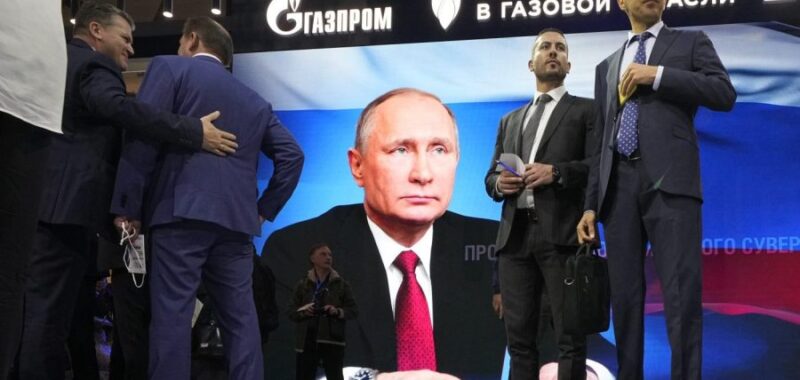
Will Putin’s genocidal war against Ukraine end in 2025? If you believe the economic projections of three brilliant economists — a Russian, a Swede and an American — the answer is very likely yes.
Vladimir Milov, Anders Aslund and Jeffrey Sonnenfeld agree that Putin’s war is economically and thus militarily unsustainable. According to them, 2025 will be crunch time for Putin’s regime.
As the Russian economy tanks, immiseration and social discontent grow, and money dries up, Putin will run out of resources to fuel his war machine. Russia’s self-absorbed dictator has a penchant for preposterous bluster and will disagree with their analysis, but his empty pockets will point to a different conclusion.
The bottom line is that a country can be a great power or wage a massive war only if it has the requisite economic wherewithal. Soldiers, supplies and armaments cost huge amounts of money. Imperialism requires even more, as it involves a heightened expenditure of resources. Economic dwarves cannot be military giants, and bankrupt economic dwarves cannot sustain wars.
If Putin didn’t think of himself as historically exceptional, he would realize from a quick look at the past that he has embarked on the road to defeat — which is bad enough — and toward the collapse of his regime and possibly his state.
Austria-Hungary and the Ottoman Empire lacked the economic resources to modernize their militaries. They not only lost World War I, but fell apart in the process. No economic giant, Imperial Russia happened to be on the winning side, but it still fell apart. Kaiser Wilhelm II and Adolf Hitler had powerful economies and thought they could afford to launch mega-wars. But when they dragged the U.S. into their respective conflicts, they thereby tipped the resource balance against themselves.
The U.S. and China have the strongest economies in the world and, unsurprisingly, are superpowers. Small wonder that America retained that status even after suffering defeats in Vietnam and Afghanistan, and a semi-defeat in Iraq. In contrast, Putin and his comrades cannot afford to lose. They know that a loss in Ukraine probably means losing their shirts, themselves and their state.
Leonid’s Brezhnev’s Soviet Union should have taught Putin a lesson. The decrepit Soviet economy couldn’t support Brezhnev’s military expenditures, foreign policy adventures and repressions in Africa, the Middle East, Eastern Europe and Afghanistan. Competing with the far richer U.S. overextended the Soviets, depressed their economy, demoralized Russians, angered non-Russians and induced Mikhail Gorbachev to adopt the reforms that ultimately killed the USSR.
Russia’s current share of nominal global GDP stands at a relatively minuscule $2 trillion, compared to America’s $29 trillion, China’s $19 trillion and Germany’s $5 trillion. In fact, Russia’s share is virtually identical to that of Canada and Mexico, neither of which has evinced imperialist aspirations.
These figures haven’t stopped Putin from taking on all of NATO (whose combined share of global GDP amounts to roughly 30 times Russia’s), expending enormous sums on the war in Ukraine, inducing close to a million young Russian professionals to flee abroad, killing or maiming over 600,000 of their comrades at home, neglecting consumer sectors, producing inflation greater than 20 percent, transforming Russia into a Chinese colony and aligning it with such economic basket cases as North Korea, Iran and Venezuela. Economic irresponsibility of such awe-inspiring magnitude never goes unpunished.
The coming year will likely be the time the you-know-what hits the fan for Putin. If Russia’s economy collapses, so too will the military and the war. Even if the military machine only slows down and the Ukrainians retake the initiative, the consequences for Putin will be devastating.
Bereft of money, Putin will have just two choices. One is to plead his case to the broader society and make concessions in return for resources — unthinkable for a megalomaniac such as him. The other will be to push his armies past the point of exhaustion in the hope that some miracle will intervene. This will only delay his defeat and the potential consequence of a coup d’etat by his former allies.
Russia’s coming economic crash has three implications. First, if Ukraine holds out and gets the support it needds, it will win, if only because Russia will lose. Second, the time to negotiate with Putin is in 2025, when his military and economy bog down — not now, when he’s still in chest-beating mode. And third, Putin may soon come to resemble France’s Louis XVI, who faced a similar problem in 1789, when a financial crisis forced him to convene the Estates General.
And we all know what happened next.
Alexander J. Motyl is a professor of political science at Rutgers University-Newark. A specialist on Ukraine, Russia and the USSR, and on nationalism, revolutions, empires and theory, he is the author of 10 books of nonfiction, as well as “Imperial Ends: The Decay, Collapse, and Revival of Empires” and “Why Empires Reemerge: Imperial Collapse and Imperial Revival in Comparative Perspective.”

